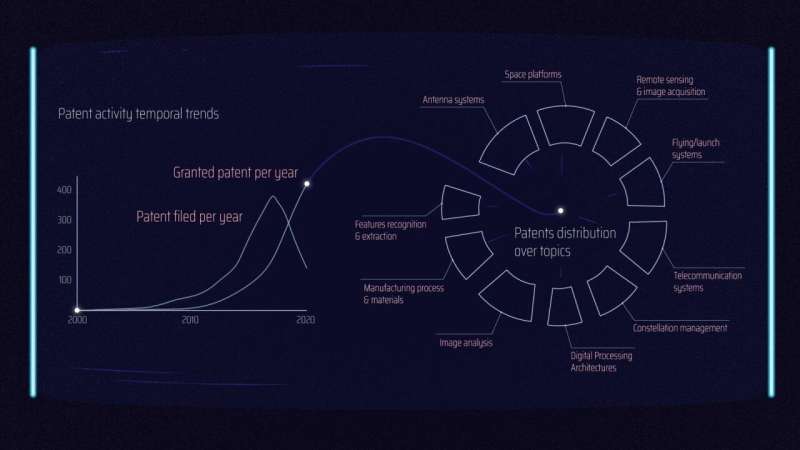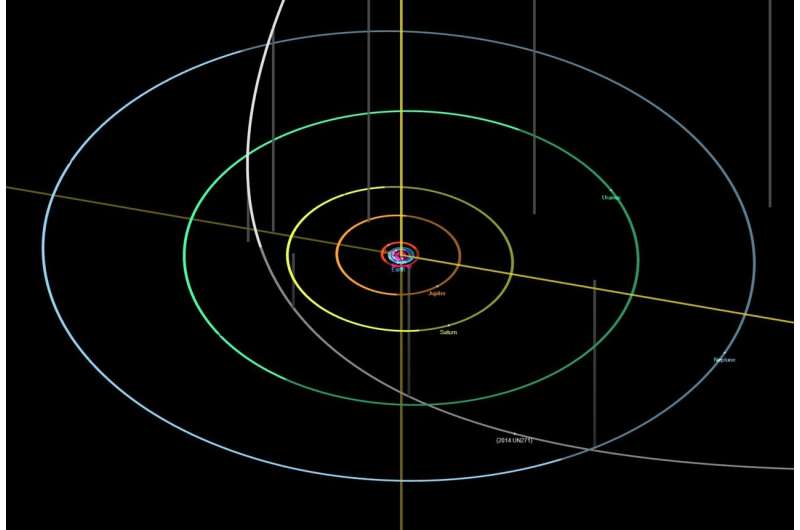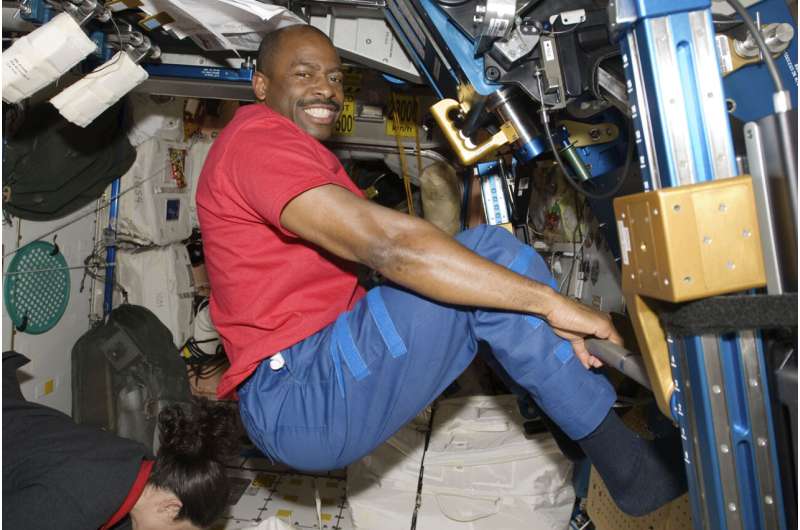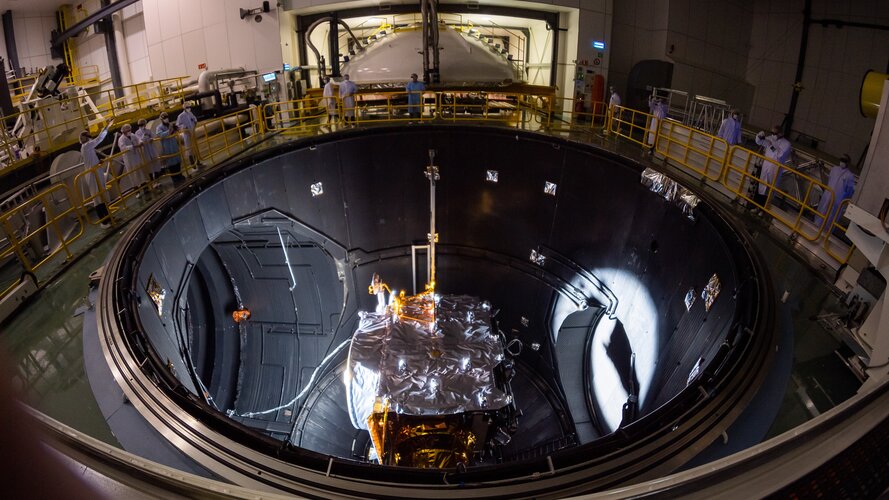
Copernical Team
CIBER-2 experiment successfully completes first flight
 By sending a Black Brant IX rocket on a 15-minute flight to space and back, researchers from Rochester Institute of Technology, Caltech, Kwansei Gakuin University, and Korea Astronomy and Space Science Institute glimpsed traces of light from the earliest stages of the universe. The Cosmic Infrared Background Experiment-2 (CIBER-2) completed a successful first launch on June 7 at the White Sands
By sending a Black Brant IX rocket on a 15-minute flight to space and back, researchers from Rochester Institute of Technology, Caltech, Kwansei Gakuin University, and Korea Astronomy and Space Science Institute glimpsed traces of light from the earliest stages of the universe. The Cosmic Infrared Background Experiment-2 (CIBER-2) completed a successful first launch on June 7 at the White Sands A new type of gravitational wave detector to find tennis ballsized black holes
 "Detecting primordial black holes opens up new perspectives to understand the origin of the Universe, because these still hypothetical black holes are supposed to have formed just a few tiny fractions of a second after the Big Bang. Their study is of great interest for research in theoretical physics and cosmology, because they could notably explain the origin of dark matter in the Universe".
"Detecting primordial black holes opens up new perspectives to understand the origin of the Universe, because these still hypothetical black holes are supposed to have formed just a few tiny fractions of a second after the Big Bang. Their study is of great interest for research in theoretical physics and cosmology, because they could notably explain the origin of dark matter in the Universe". Jezero crater's 'Delta Scarp' revealed in new images
 A Perseverance rover scientist's favorite shot from the young Mars mission provides a new angle on an old and intriguing surface feature. Ask any space explorer, and they'll have a favorite image or two from their mission. For Apollo 8's Bill Anders, it was a picture looking back at the Earth from near the Moon.
Astronaut Randy Bresnik prizes a photo of an aurora he took while aboard the I
A Perseverance rover scientist's favorite shot from the young Mars mission provides a new angle on an old and intriguing surface feature. Ask any space explorer, and they'll have a favorite image or two from their mission. For Apollo 8's Bill Anders, it was a picture looking back at the Earth from near the Moon.
Astronaut Randy Bresnik prizes a photo of an aurora he took while aboard the I Lockheed Martin aeroshell selected to for next Mars lander
 NASA's Jet Propulsion Laboratory awarded Lockheed Martin a contract to design and build the aeroshell for the Mars Sample Retrieval Lander. The capsule will protect the spacecraft through its landing sequence on Mars when it hits the atmosphere with extreme speed and force that generate thousands of degrees of heat.
"We are excited to partner with JPL again to design, fabricate and test an
NASA's Jet Propulsion Laboratory awarded Lockheed Martin a contract to design and build the aeroshell for the Mars Sample Retrieval Lander. The capsule will protect the spacecraft through its landing sequence on Mars when it hits the atmosphere with extreme speed and force that generate thousands of degrees of heat.
"We are excited to partner with JPL again to design, fabricate and test an Astronauts enjoy many food, beverage choices in orbit
 Astronauts on board the core module of China's space station have a wide variety of foods specifically designed for them to enjoy during their three-month space journey, according to project leaders.
Ji Qiming, assistant director of the China Manned Space Agency, said that there are more than 120 kinds of food and beverages inside the core module, named Tianhe, or Harmony of Heavens. These
Astronauts on board the core module of China's space station have a wide variety of foods specifically designed for them to enjoy during their three-month space journey, according to project leaders.
Ji Qiming, assistant director of the China Manned Space Agency, said that there are more than 120 kinds of food and beverages inside the core module, named Tianhe, or Harmony of Heavens. These Does outer space end or go on forever
 Right above you is the sky - or as scientists would call it, the atmosphere. It extends about 20 miles (32 kilometers) above the Earth. Floating around the atmosphere is a mixture of molecules - tiny bits of air so small you take in billions of them every time you breathe.
Above the atmosphere is space. It's called that because it has far fewer molecules, with lots of empty space between t
Right above you is the sky - or as scientists would call it, the atmosphere. It extends about 20 miles (32 kilometers) above the Earth. Floating around the atmosphere is a mixture of molecules - tiny bits of air so small you take in billions of them every time you breathe.
Above the atmosphere is space. It's called that because it has far fewer molecules, with lots of empty space between t Patents help build a global map of new space industry

Skoltech researchers and their colleagues from Russia and Serbia have reviewed almost a thousand patents held by some two hundred organizations involved in the New Space economy. The analysis helped draw a comprehensive picture of technology trends in the field. The paper was published in the journal Progress in Aerospace Sciences.
'New Space' is a loosely-defined term that encompasses the recent flurry of space-related activities coming from smaller actors rather than a handful of space-faring nations. Put somewhat simply, while the Apollo missions were more traditional, SpaceX, Rocket Lab (launching small satellites from New Zealand) or LeoLabs (a space junk tracking company) are undeniably parts of a new and different space economy. In a 2020 paper, Skoltech Associate Professor Alessandro Golkar and Alejandro Salado of Virginia Tech found three distinguishing traits of New Space companies: explicit customer focus, new product development approaches, and new business models.
"In a nutshell, the main difference relates to how New Space organizations develop their products and how they approach the business. New Space organizations tend to embrace innovative development processes such as agile, have a risk-taker attitude, and focus on profit.
Space object with orbit stretching into the Oort cloud discovered

Astronomers Pedro Bernardinelli and Gary Bernstein discovered a space object recently that has an orbit around the sun and also stretches into the Oort cloud—they have named it 2014 UN271. The researchers made the discovery while studying archival images collected for the Dark Energy Survey over the years 2014 to 2018. Since its discovery, entities such as the MMPL forum, the Minor Planet Center and JPL Solar System Dynamics have been tracking the object and have found that it will make its closest approach to Earth in 2031.
Measurements of the object put it between the size of a very small planet and a comet—it is believed to have a diameter of 100 to 370 km. If it turns out to be on the larger end of that spectrum, it would mark the largest Oort cloud object discovered to date. But it is the path of the object that has drawn the attention of astronomers—its orbit is nearly perpendicular to the plane created by the nine inner planets and takes it deep into the solar system and into the Oort cloud.
Dirty laundry in space? NASA, Tide tackle cleaning challenge

Juice in Large Space Simulator
 Image:
Juice in Large Space Simulator
Image:
Juice in Large Space Simulator 
